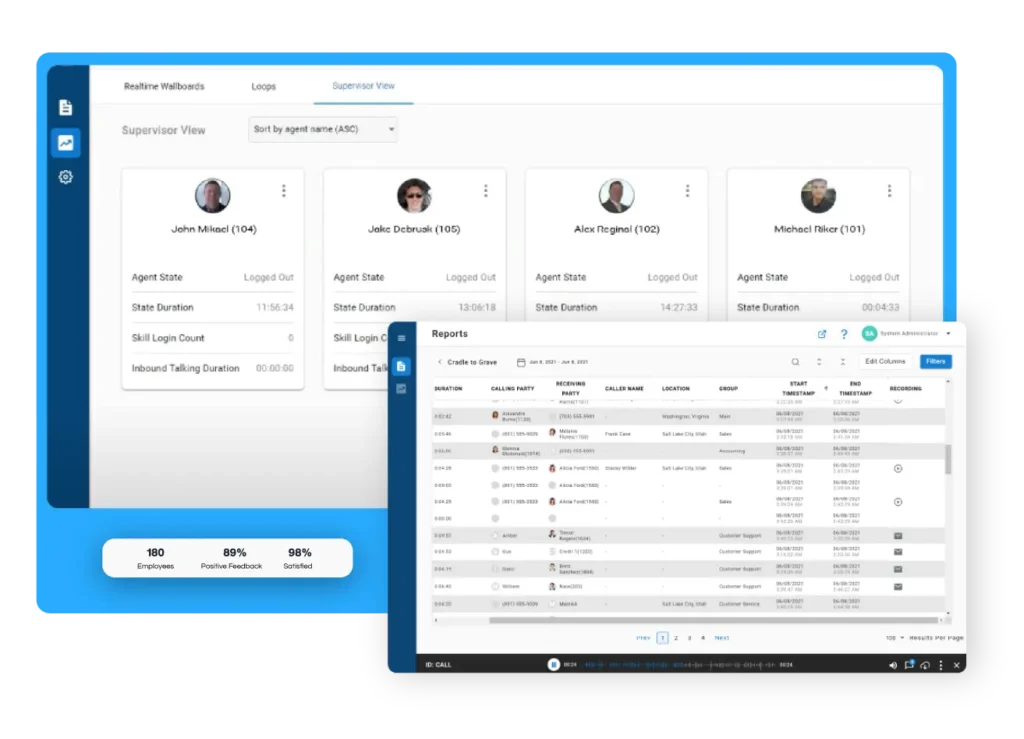In this guide, we’ll examine the five best contact center software for small businesses, including their capabilities, pros, and cons, so you can choose a solution that empowers your team and delivers exceptional customer experiences.
Key Takeaways
- Contact center software can be a great asset for small businesses because it streamlines customer communication, improves efficiency, and provides the tools to deliver better service while scaling affordably as the business grows.
- Small businesses should look for contact center features like user-friendliness, omnichannel communication, intelligent call routing and IVR, reporting and analytics, integrations, and call monitoring and recording.
- The five best contact center software for small businesses are Xima, Zendesk, RingCentral, Aircall, and Five9.
- Xima’s contact center solution offers small businesses enterprise capabilities without the complexity or overhead.
A Quick Glance at the Best Contact Center Software
Feature | Xima Contact Center | Zendesk | RingCentral | Aircall | Five9 |
Key Features |
|
|
|
|
|
Best For | SMBs that want powerful CX tools with enterprise depth but without enterprise headaches | Small teams already invested in Zendesk who want built-in phone functionality with minimal setup | SMBs growing quickly and needing a robust, secure platform that handles both internal communication and customer contact | SMBs prioritizing ease of use for voice workflows and integrations | SMBs running large outbound campaigns and willing to invest in advanced automation and workforce tools |
Price | Contact for pricing | Starts at $19/agent/month | Contact for pricing | Starts at $30/license/month | Starts at $119/month |
Website | https://www.five9.com/products/capabilities/contact-center-software |
5 Best Contact Center Solutions for Small Businesses
Choosing the right small business contact center software starts with understanding what each option brings to the table and how it aligns with your business goals. We’ve broken down the five best contact center software for small businesses below to help guide your search.
1. Xima Contact Center
Xima delivers a modern contact center solution built to give SMBs enterprise-grade power without the complexity. Whether deployed in the cloud or on-premises, Xima integrates easily with existing phone systems and leading CRMs like Salesforce, HubSpot, and Zendesk. Its hallmark is “Cradle-to-Grave” reporting, which captures every interaction from start to finish and provides deep insights that help teams work smarter. With Xima’s flexible licensing and add-ons, businesses can start small and expand capabilities as they grow without switching platforms.
Pros for Small Businesses:
- User-friendly interface that minimizes training time
- Powerful “Cradle-to-Grave” reporting and analytics
- Robust call recording and skills-based routing
- Queue callback to cut customer wait times
- Competitive pricing, including pay-per-use models
- AI and automation features to drive efficiency
- White-glove customer support and onboarding
- CRM integrations
- Cloud and on-premise deployment options
- Flexible licensing that grows with your business
Cons for Small Businesses:
- Advanced features may take time to master, but this upfront investment pays off by giving SMBs a scalable, long-term solution.
- Smaller teams may not use every tool right away, yet these capabilities create a clear path for growth and offer a competitive edge.
2. Zendesk
Zendesk is a customer service platform that simplifies omnichannel support and ticket management. Its contact center solution integrates directly with the Zendesk ecosystem, making it a good option for businesses already using their CRM or help desk tools. Zendesk offers a clean agent workspace and multi-channel support that keeps customer interactions organized and accessible.
Pros for Small Businesses:
Unified agent workspace with a strong ticketing system
Multi-channel support (chat, email, social, voice)
Easy integration with other Zendesk tools
Streamlined for service-driven teams
Cons for Small Businesses:
Costs can escalate as you unlock more advanced features
May feel overwhelming for very small teams
Setup can be complex outside of entry-level plans
3. RingCentral
RingCentral is widely recognized for its unified communications platform, which combines voice, video, messaging, and contact center tools in a single system. Its contact center offering builds on its VoIP foundation and provides scalability, reliability, and analytics features that can serve a range of business sizes, including SMBs.
Pros for Small Businesses:
Unified communication tools (voice, video, chat, fax)
Highly scalable
Detailed reporting and analytics
Strong mobile app for remote or hybrid teams
Cons for Small Businesses:
Extensive features and capabilities may be overwhelming for SMBs
Lower-tier plans lack some popular integrations, especially with CRM software
4. Aircall
Aircall is a cloud-based phone system designed with SMB sales and support teams in mind. Its strength lies in its simplicity: fast setup, intuitive design, and seamless integrations with tools like Salesforce and HubSpot. With features like call whisper and barge for coaching, Aircall helps teams stay efficient while prioritizing clear, effective voice communication.
Pros for Small Businesses:
Quick, easy setup with minimal training required
Clean, user-friendly interface
Call coaching tools
Strong emphasis on voice features for support and sales
Cons for Small Businesses:
Limited omnichannel capabilities beyond voice and basic SMS
Pricing may become less competitive as call volumes or teams grow
Limited analytics compared to larger CCaaS platforms
5. Five9
Five9 is a cloud contact center solution known for its deep feature set and advanced AI tools. While it’s often viewed as an enterprise option, many SMBs use Five9 to gain access to robust omnichannel support, intelligent routing, and detailed analytics. It has a scalable design that can make it a good solution for businesses that want to invest in long-term growth and efficiency.
Pros for Small Businesses:
Full omnichannel support across voice, chat, email, and social
Intelligent routing for faster resolution
Advanced analytics and performance reporting
AI tools like Agent Assist and Virtual Agents
Cons for Small Businesses:
Steeper learning curve due to its wide feature set
Higher pricing than lighter SMB-focused options
May be best suited for mid-sized SMBs planning significant growth
Benefits of Contact Center Software for Small Businesses
Running a small business means balancing customer expectations with limited resources. Contact center software gives SMBs access to tools that streamline operations, strengthen customer relationships, and prepare for growth. Here’s how the right solution can make a measurable difference:
Enhanced Customer Experience & Satisfaction: Features like intelligent call routing, CRM integration, and queue callbacks reduce wait times and enable more personalized interactions. This leads to happier customers, stronger reviews, and long-term loyalty.
Improved Operational Efficiency & Productivity: Automation tools such as IVR and ACD take repetitive tasks off agents’ plates, while real-time monitoring helps managers optimize staffing. As a result, small businesses can handle higher volumes with fewer resources.
Scalability for Growth: Cloud-based solutions allow businesses to add or remove agents and features as needed without heavy IT investment. This flexibility enables small businesses to adapt quickly to seasonal demand or prepare for long-term growth.
Cost Savings & Predictable Spending: Subscription pricing shifts expenses from large upfront investments to manageable monthly costs. With lower infrastructure requirements and shorter training times, SMBs gain predictable budgets and faster ROI.
Data-Driven Insights for Better Decisions: Reporting and analytics provide visibility into call volumes, agent performance, and customer behavior. These insights help SMBs refine operations, improve service quality, and make confident, strategic decisions.
Contact Software Features Small Businesses Should Look For
When evaluating contact center software, small businesses should focus on features that directly solve their everyday challenges: limited staff, tighter budgets, and the need to deliver excellent service without overcomplicating workflows. The following capabilities are especially important for building efficiency and scalability into your customer experience strategy.
User-Friendliness & Quick Implementation
Intuitive interfaces are critical, especially for small businesses without dedicated IT teams. Software that’s easy to set up and requires minimal training allows agents to get started quickly. The right solution should be accessible from day one.
Core Communication Channels (Voice, Chat, Email, SMS)
Your customers expect to reach you on the channels they prefer, whether that’s phone, chat, email, or text. Having multi-channel communication in one platform streamlines conversations and reduces the need for multiple tools.
Intelligent Call Routing & IVR
Intelligent, skills-based call routing ensures calls are directed to the right agent the first time. This reduces transfers and frustration. Interactive voice response (IVR) menus help guide customers quickly, improving resolution rates and overall satisfaction.
Reporting & Analytics
Data is key for small businesses looking to make improvements with limited resources. Reports on call volume, agent performance, and customer behavior provide clear insights that support better staffing decisions and stronger customer service.
CRM & Business Tool Integrations
When your contact center integrates with existing CRM or business platforms, agents gain instant access to customer histories and relevant information. This saves time, reduces duplicate work, and makes interactions more personalized.
Call Monitoring & Recording
Call recording and monitoring are essential for training, quality assurance, and resolving disputes. For smaller teams, these features help managers coach agents in real time and maintain consistent service standards.
Flexible & Transparent Pricing Models
Small businesses need predictable costs that fit within budget. Subscription-based or pay-per-use models make it easier to control spending while still giving you room to scale as your needs grow.
Reliable Customer Support from the Vendor
Without a large in-house IT department, SMBs rely on their provider for accessible, responsive support. A vendor that offers dependable assistance ensures your team can stay focused on serving customers instead of troubleshooting software.
Find the Right Contact Center Solution For Your Business
The right contact center software for small businesses can become the engine that drives better customer experiences, greater efficiency, and long-term growth. There are many platforms designed for SMBs, but few deliver enterprise-grade capabilities in a way that remains simple and accessible for smaller teams. Xima stands out by combining flexible deployment, deep reporting, seamless integrations, and white-glove support into one solution that grows alongside your business.
Ready to see the difference for yourself?
Book a demo with Xima and discover how our contact center solution can help your business work smarter, deliver better service, and grow with confidence.
FAQs About Contact Center Software
Pricing depends on the features you need and the size of your team, but most SMBs can expect a monthly subscription model that charges per user. This makes costs predictable and allows you to scale up or down as your business changes. Some providers also offer pay-per-use options, which can be a great fit for smaller teams that want flexibility without committing to a large upfront investment.
If your team is spending too much time juggling calls, emails, and chats, or if customers are waiting too long to get help, contact center software can make a big difference. It centralizes communication, routes inquiries to the right people, and gives you the data you need to see where improvements are needed.
Modern contact center solutions are typically straightforward to set up. Many cloud-based platforms can be implemented quickly, with intuitive interfaces that minimize training time for your team. The right provider will also offer strong onboarding and support to make the transition as smooth as possible.
The best solution is one that balances powerful features with ease of use and scalability. While there are many platforms on the market, Xima stands out for giving SMBs enterprise-level tools like advanced reporting, intelligent routing, and CRM integrations in a way that remains simple and budget-friendly. With flexible deployment and white-glove support, it’s built to grow alongside your business.



